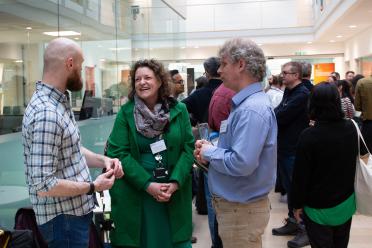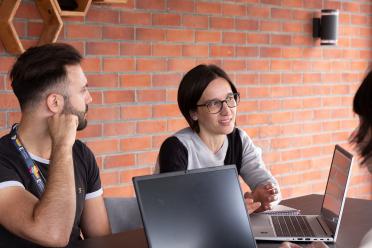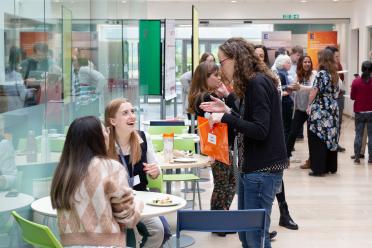Creating space for conversation on World Mental Health Day
Caring for our mental health is fundamental.
The way we interact with each other, build relationships, and function in society is entirely dependent on our mental health. According to the mental health charity, Mind, about 1 in 4 people will experience some kind of mental health problem each year in England.
Today, on World Mental Health Day, we are celebrating a dedicated group of people who are determined to ensure that everyone has access to mental health support. Trained in Mental Health First Aid by MHFA England, they give their time, energy and emotional bandwidth to anybody who needs it.
They are not paid, they are not asked – but instead they actively volunteer to ensure that everybody has someone to talk to. We had a chat with some of them to find out more about their motivations and why they believe mental health support is so important.
Roanne Ephithite is an Events Manager at the Earlham Institute, and one of the five trained Mental Health First Aiders in the building: "I know personally how beneficial it is to be open, and to talk to people about things going on in your life.
"As a Mental Health First Aider, I can offer the opportunity for people to have access to an impartial, non-judgemental person who can act as a sounding board and signpost where they can go for professional support."

Having experienced the value of this myself, I am passionate about being able to provide this experience for others.

Roanne



Roanne explains that Mental Health First Aiders are trained in active listening, a core skill that places the individual at the centre of the conversation and enables them to use the space to explore their feelings.
It is important to note that Mental Health First Aiders are not mental health professionals. Instead, they offer a first point of call for a conversation about any problems you may be experiencing and can direct you to a professional if needed.
Dave Wright is a Senior Computational Biologist at the Earlham Institute. As well as being a trained Mental Health First Aider, Dave is also the mental health champion and sits on Earlham’s IDEA committee.
"Everyone has different aspects about their roles they find fulfilling. For me, providing help and support to my colleagues and working towards a sense of community are core aspects I genuinely care about. Whether it’s a cup of tea and a chat, directing people to materials or signposting for professional services, MHFA support is entirely driven by the person who has reached out," says Dave.
Dave is passionate about ensuring there is space for these conversations in the workplace.

We are all human and we need work environments where people feel comfortable being themselves, expressing what they need to and feeling supported.

Dave
Cam Ryan is also a mental health first aider and works as a bioinformatician at the Earlham Institute.
"You don’t need to wait until a crisis before you reach out to a mental health first aider. Everyone has bad days, and it really helps to be able to talk to someone. Prioritising mental health is just as important as your physical health," she explains.
Just as we would seek support for a physical ailment, it’s equally important to recognise that mental health deserves the same level of care and attention. Mental Health First Aid is about creating a confidential space to explore an issue with a caring, non-judgemental, impartial person.
There are a team of people trained in Mental Health First Aiders across the Norwich Research Park to enable you to select who you feel most comfortable talking to. You can also choose how you would like to interact with a Mental Health First Aider; it could be messages, online call, going for a walk, getting a coffee or finding a meeting room. The most important point is that you feel safe, comfortable and supported through their compassion and skills.
As Cam notes, "the main thing we do is listen - that simple act can make the world of difference."
If you or someone you know needs to talk about mental health, contact your local mental health organisations such as Mind or Samaritans or speak to your GP, who will be able to signpost you to help and support.